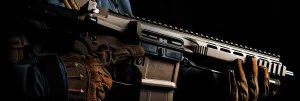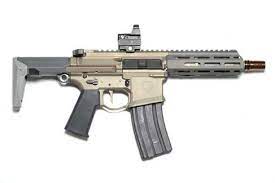Gun trusts have a number of benefits, regardless of the type of firearm in the trust. But most people use gun trusts for guns which are difficult to obtain and possess under the National Firearms Act. In this situation, a gun trust makes the initial transaction and subsequent possession easier. A gun trust also makes it easier to pass these firearms along to people who will appreciate them.
The NFA imposes restrictions on the sale and transfer of certain items. Additionally, states may pass their own limitations which may exceed NFA guidelines. The same is true in other areas. For example, states like California can usually pass more restrictive environmental regulations than the ones included in the Environmental Protection Act.
So, while a gun trust is valid in all states, the corpus (property inside the trust) may vary from state to state.
Georgia NFA Firearms
In general, the Peach State has very gun owner-friendly NFA laws. It is typically legal to possess any properly-registered NFA item. Additionally, Georgia law defines many terms a bit differently. For example, under Section 16-11-121, a “machine gun” is “any weapon which shoots or is designed to shoot, automatically, more than six shots, without manual reloading, by a single function of the trigger.” That’s a more common-sense definition of machine gun which is different from many other definitions in many other jurisdictions.
There’s more. As of July 2014, it is legal to hunt with a silencer in Georgia. That’s a significant benefit for hunters. So, Georgia’s NFA laws benefit both collectors and users. Those are the two categories of people most likely to use gun trusts.
In Georgia, it is legal to possess the following:
- Machine Guns: As mentioned, many firearms which are “machine guns” in other states are automatic or semi-automatic rifles in Georgia. Moreover, additional modifications do not count. To qualify as a machine gun, the weapon must have been designed as such when it left the factory.
- Destructive Weapons: This ominous-sounding designation includes weapons which fire rockets, like bazookas. Other wartime instruments, such as hand grenades and mortars, have this designation as well.
- Short Barrel Shotguns and Sawed-Off Rifles: These modified guns must have barrels shorter than sixteen inches (rifle) or eighteen inches (shotgun).
- Silencers: As outlined below, these attachments do not just benefit professional killers in movies and television but have legitimate uses such as hearing protection and game hunting.
- AOW: The broad “Any Other Weapon: category basically includes incredibly small pistols or incredibly large pistols. Believe it or not, there are pistols which look like pens, cigarette lighters, and other unobtrusive things. Moreover, some pistols, such as the H&R Handy-Gun, are actually explosive devices.
These categories represent basically all NFA firearms. The NFA may also apply to gun attachments, like silencers.
Why Would You Want to Own an NFA Firearm?
Silencers greatly enhance hunting opportunities. Instead of scaring off nearby game with the first shot, hunters can stay in one area longer than usual.
Suppressors
Silencers are also good for city slickers. These attachments eliminate the risk of noise-induced hearing loss, which is a significant problem, especially when someone fires a weapon in a relatively confined space. Silencers also improve accuracy by extending the length of the barrel, and they make the neighbors complain less about gun noise.
Silencers are good for practical reasons, and machine guns are very good investments. Way back in 1986, President Ronald Reagan signed legislation which basically prevented people from buying collectible machine guns, like Tommy guns and Uzis. Almost overnight, the number of these firearms available dropped by about half.
Over the subsequent years, ever-increasing red tape and legal restrictions made these weapons even rarer. The fewer there are the more valuable they become. The aforementioned Tommy gun increased in value some 200 percent between 2004 and 2018. Try getting that kind of return on the stock market. If you are looking for an investment opportunity, machine guns may be your thing.
Destructive Devices
Destructive Devices are fairly good investments as well, but probably not as good as machine guns. Most people own things like bazookas and mortars because they are little pieces of history. When you see these items up close, you realize how clumsy and unreliable they are. Yet somehow, American GIs won a war against a very determined enemy using weapons like these.
There is also an undeniable coolness factor. DDs always draw crowds at gun shows.
SBR’s
Sawed-off shotguns and short-barrel rifles are perhaps the most commonly-owned NFA firearms in Georgia. Pretty much any owner can make one. And, there is some very good reasons you may want one in your home.
In the movies, people use sawed-off shotguns to bloody effect against good guys and bad guys alike. But real life is a bit different. Shorter barrels mean much lower muzzle velocity as well as fewer pellet spread.
These two factors make sawed-off guns like these excellent for home defense. If you have to pull the trigger, there is almost no way you’ll hit anything other than the target. Plus, most bad guys don’t read scientific studies about muzzle velocities. But they have seen movies that greatly exaggerate the effects of sawed-off shotgun. So, there is a substantial home defense intimidation factor.
What are the NFA Laws in Neighboring States?
Georgia was a red state long before the term was invented. In 1964, a number of Americans had serious concerns about issues like the Vietnam War and civil rights. But Georgia, South Carolina, Alabama, Mississippi, and Louisiana were the only states that voted against incumbent Lyndon Johnson in the November election. Even today, these original red states have highly similar NFA restrictions.
South Carolina
If you cross the line from Georgia to the Palmetto State, do not fret. The NFA restrictions in South Carolina are pretty much non-existent as well. However, watch out for the “machine gun” definition. These weapons are defined differently in South Carolina. The difference should not affect gun trusts, but could significantly affect individual owners.
Alabama
Before 2010, the Yellowhammer State was basically a purple state with regard to NFA firearms. It was illegal to own short-barreled rifles and some other Title II firearms.
But today, Alabama’s NFA laws are almost exactly like South Carolina’s. However, there are some additional AOW bans. In Alabama, it is illegal to own a rifle or shotgun which is disguised as a walking cane. If any state prohibited such weapons, one might think it would be South Carolina. But for some reason, the ugly Charles Sumner-Preston Books 1856 caning incident upset lawmakers in Alabama more than the folks in South Carolina.
Florida
Continuing a familiar pattern for this part of the country, the Sunshine State has no additional NFA restrictions. However, authorities are a bit picky when it comes to NFA gun trusts.
The language must be very precise and specific. Many people try to adapt boilerplate trust forms they found on the internet and make them into gun trusts. In a few states, you can get by with that. But Florida is not like that.
Tennessee
Until 2015, Tennessee was a DTP state, along with Texas, Alaska, Oklahoma, and a few other jurisdictions. In Defense to Prosecution jurisdictions, possession of AOWs, machine guns, DWs, and all other NFA firearms are illegal under state law. IN court, the judge must accept NFA permission as a defense to prosecution. So, until 2015, it was legal to possess such weapons in Tennessee, but if the cops found them, the owner could still be arrested and prosecuted.
But lawmakers significantly revised the DTP law in 2015. As a result, today’s gun trusts need not be nearly as intricate in Tennessee as they had to be a few years ago. So, a Marietta gun trust attorney can easily prepare your trust, and you can have even more confidence if you must cross state lines with an NFA firearm.
North Carolina
The Tarheel State is generous when it comes to NFA possession. These laws mirror the other Georgia Border States. North Carolina imposes few, if any, additional restrictions over and above the NFA.
On a related note, North Carolina also has some firearms possession restrictions which some other states do not have. The naughty list includes:
- Most felony indictments (as opposed to a felony conviction) in any state,
- Persons with outstanding warrants,
- Addiction to certain substances (as opposed to using certain substances), like marijuana or cocaine, and
- A dishonorable military discharge.
Keep these additional restrictions in mind when you make your gun trust. Normal state possession laws apply to all gun trust beneficiaries and co-owners. Even if they are entitled to an interest in the corpus (items in the gun trust), these people must meet state law qualifications.
5 Hidden Benefits of Gun Trusts
In all states, NFA gun trusts make it easier to transfer NFA firearms. A trust can have an unlimited number of members or beneficiaries. There are some additional benefits as well:
- Instructions to Administrators: NFA gun trusts are a little like living wills. A directive to physicians tells doctors how you want them to handle end-of-life issues. A gun trust tells an executor how to dispose of the firearms in the trust. As a bonus, the transfer tax usually does not apply in gun trust transfer cases.
- Trustee Power: Firearms restrictions are in a constant state of change. Gun trust trustees have the power to deny possession to beneficiaries and members if state requirements change.
- Instructions to Beneficiaries: An NFA gun trust can also be an information clearinghouse. Instead of scouring the internet for the necessary forms and hoping they filled them out right, a gun trust can contain both forms and information. This information usually comes from a licensed attorney who is experienced in these matters.
- Trust Status: A gun trust is a revocable living trust. So, the trustee (person who administers the trust) can add or delete beneficiaries at any time. Additionally, the settlor (person who creates the trust) and trustee is usually the same person. So, you have additional power.
- Unequal Distributions: When the settlor dies, the gun trust corpus does not pass proportionally with the other probate or non-probate assets. In other words, you can give some people more stuff than other people. Such unequal gifts must be designed to preserve trust assets.
Gun trusts are a good way to overcome some of the subtle differences in state NFA laws. For a confidential gun trust consultation with an experienced firearms’ rights attorney in Marietta, contact NFA Lawyers, LLC.



 Some FAQs About Georgia CCW Laws
Some FAQs About Georgia CCW Laws